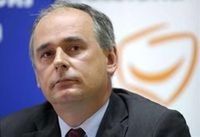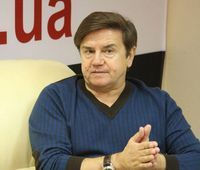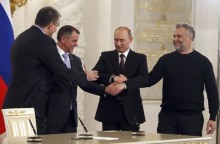“Putin’s ultimate aim is weakening the EU and even its collapse”
Pawel ZALEWSKI, MEP, member of the European Parliament delegation in the EU-Ukraine Parliamentary Cooperation Committee:
“By approving the decision on annexation of the Crimea, Putin and Russian power brutally violated the international law. I am speaking not only about the Crimea, which is an instrument of pressure on Ukraine. In my opinion, although we are speaking about Ukraine, it is not the end of President Putin’s ambitions. Russia has entered economic stagnation; soon it will have to use the reserves, which are huge, yet limited. The model of Russia’s oil-based growth has come to end; on the other hand, the EU already now starts to demand from Russia to behave like a civilized country. This is a threat to Russian elite which is based on corruption and blackmailing. Putin’s ultimate aim is weakening the European Union and even its collapse. Therefore the Crimea is not the end of Putin’s aggressive ambitions. I am convinced that the thing is about strengthening of its position concerning the EU and getting more profit, which Russia cannot increase under conditions of normal competition and normal economic actions.”
Were the actions of Europe aimed at stopping Putin?
 “There are no sanctions the EU and the US haven’t used to prevent Russia from annexing the Crimea.
“There are no sanctions the EU and the US haven’t used to prevent Russia from annexing the Crimea.
“But now it is important that it was the first time the EU imposed sanctions on Russia. And it did it jointly with the US on the same day. This is very important, because it is proof that the policy concerning Russia is being changed in Europe; Europe refuses from naive policy, which was favorable for cooperation with Ukraine, at the same time counting that Russia would become more democratic and modernized. But Russia remains an authoritarian country, which is strengthening autocracy. Here it is very important for the EU to become less dependent on Russia. And this process has been launched. The EU is very much interested in becoming less dependent on Russia.
“Three elements are important in this concern. First, we must render effective help to Ukraine. And it means financial, technical, and administrative help, especially in east and south of Ukraine.
“Secondly, it is important for the EU to become less dependent on Russia and react faster and more actively to Russian aggression.
“Thirdly, no less important thing is strengthening of NATO, so that the Alliance became stronger, because the threat from Russia is evident.”
And a good answer from the EU is the proposal voiced by Commissioner Stefan Fuele to accept Ukraine to the EU and give Membership Action Plan to Ukraine at the NATO summit in September.
“Here everything depends on Ukraine, whether it wants to become a member of NATO. I think it’s a process. I would be careful here, because Ukraine will not become a NATO member soon. But this may provoke Russia to new acts of aggression concerning Ukraine. However, it is important to sign the political part of the Association Agreement on March 21. It is important to show: Ukraine chooses Europe, and Europe chooses Ukraine. This is very important in terms of politics. On the other hand, an important thing is that the EU will remove customs duty for Ukrainian goods, which will be exported to the European market.”
What real quick steps should the EU make concerning Russia, which has completely ignored the demands to start de-escalation, withdraw its troops from the Crimea, and start a dialog with Kyiv, and now has in fact annexed the autonomy?
“Above all, Europe should become less dependent on Russian gas. This is a process, which cannot be fast. But one thing can be done immediately: the construction of the gas pipeline Southern Stream can be blocked. On my initiative and the initiative of MEP Krzysztof Lisek, the clause on halting this pipeline was included in the resolution of the European Parliament on Eastern Partnership, because it makes the EU more dependent on Russia. We must look for new suppliers of gas. Those can be the US, Southern Africa, and Near East. So, there are possibilities, only political will is needed. I think this will is beginning to show in Germany.
“I think the visa sanctions against members of the Russian parliament and government which supported the shameful decision on annexation of the Crimea should be immediately imposed. It is unthinkable for me that members of the European Parliament will maintain contacts with MPs of Russian Duma and Council of Federation. President Putin is spreading nationalistic-chauvinistic moods in Europe. The best comparison here is Stalin’s and Nazi terror in Europe. No one should contact with the incumbent members of Russian government. Only with Putin and Lavrov, because we must carry on a dialog and exert pressure on them. Those who approved such a decision today are mocking at the international law and values, and all relations should be broken with such people.”
“Ukraine needs to strengthen its statehood in all dimensions”
Vadym KARASIOV, political scientist, director of the Institute of Global Strategies:
 “Putin’s speech indicates that we will not be left alone. Putin views Ukraine as a historical misunderstanding, so he thinks there is a need for constant protection of Russian-speaking fellow countrymen in a part of Ukraine, apparently considering that the Ukrainian state either will not or cannot protect its citizens. At the same time Putin uses the notions ‘fellow countrymen,’ ‘population,’ ‘Russian-speaking,’ ‘Slavic ethnos,’ but not ‘citizens,’ which don’t have any ethnic connotations. A citizen is a subject whose rights are protected by law, by political-legal system of one or another country. Putin does not turn to this category at all. He thinks not in the framework of legal relations, but from the viewpoint of linguistic, religious, ethnic belonging of people.
“Putin’s speech indicates that we will not be left alone. Putin views Ukraine as a historical misunderstanding, so he thinks there is a need for constant protection of Russian-speaking fellow countrymen in a part of Ukraine, apparently considering that the Ukrainian state either will not or cannot protect its citizens. At the same time Putin uses the notions ‘fellow countrymen,’ ‘population,’ ‘Russian-speaking,’ ‘Slavic ethnos,’ but not ‘citizens,’ which don’t have any ethnic connotations. A citizen is a subject whose rights are protected by law, by political-legal system of one or another country. Putin does not turn to this category at all. He thinks not in the framework of legal relations, but from the viewpoint of linguistic, religious, ethnic belonging of people.
“Putin’s speech had a slight implication that the Ukrainian statehood can be reformatted under conditions that will be advantageous for Russia. For Putin the main danger is that Ukraine can go to the West, the EU and NATO. Russian operation in the Crimea is directly connected with this. Putin views Ukraine as a reason not only to rewrite the rules of the world politics on conditions which are beneficial for him, but also, making use of the ‘Ukrainian crisis’ together with the countries of the West create Ukrainian statehood and sovereignty which would be convenient for Russia – not for Ukrainian citizens. He also claims to be one of the guarantors of Ukrainian sovereignty. I am speaking about the federal form of government, Russian as a state language, military-political neutrality, etc. In Putin’s speech we should see the demand of the current Russian elite to the model of statehood which will be advantageous for Russia.
“Hence Ukraine should create or strengthen its own statehood in all dimensions and meanings of this word. If there is no strong, legal, efficient, and full-fledged state, there will always be a reason or conditions to justify the right to intrude into Ukraine’s home affairs.”







